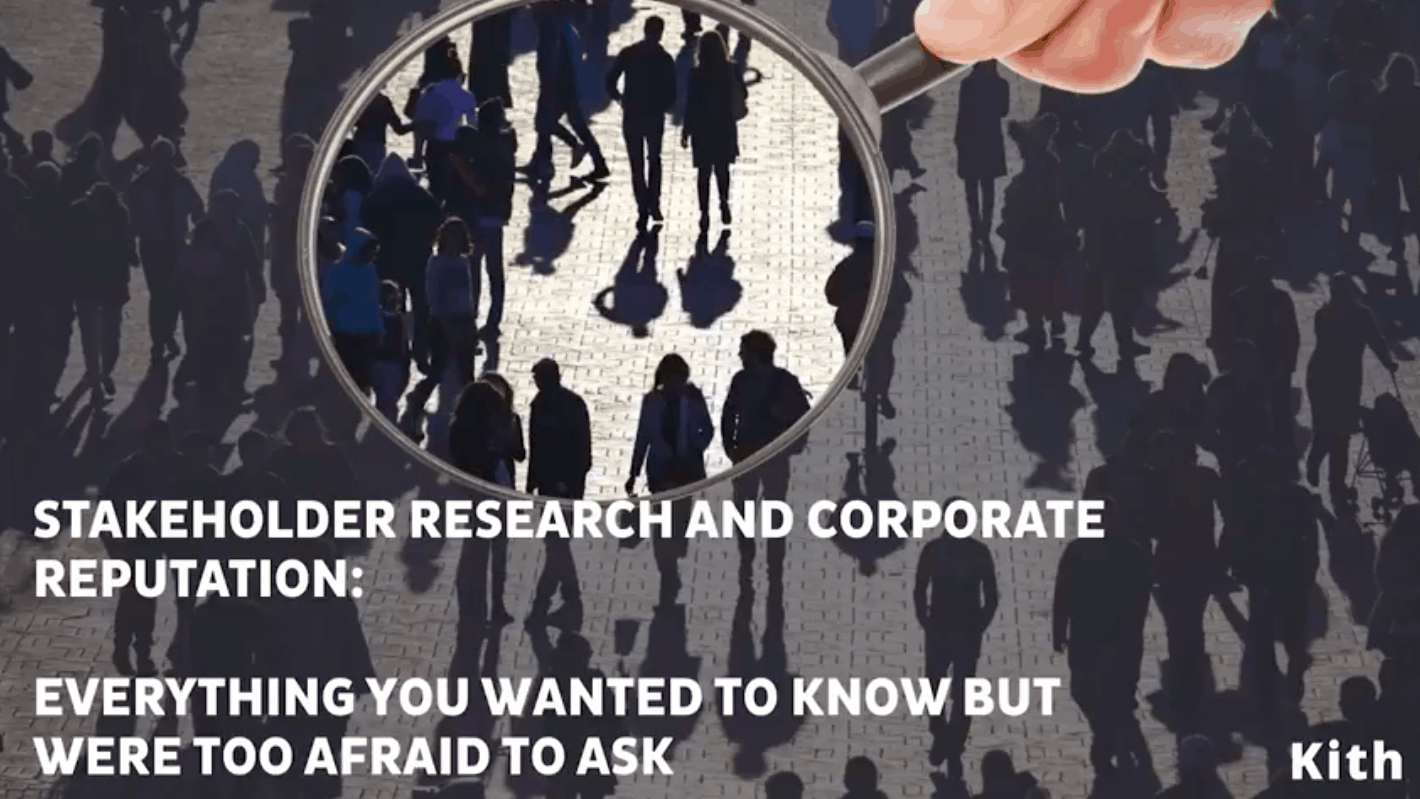By Bill Coletti, CEO, Kith
Critical Takeaways
- Stakeholder research is a critical component of any reputation management program
- Do not forget your internal stakeholders
- Any stakeholder research is better than no research at all
Chances are you know you need stakeholder research. You may have used it to measure customer satisfaction, to see if your latest ad is well received, or to inform product development. But did you know you can also use it to build your company’s reputation?
If you didn’t, you’re not alone. Many companies are unaware that stakeholder research is an integral part of managing reputation. At Kith, we think stakeholder research so important that we made it its own element in our model for reputation excellence.
Our model for reputation excellence is composed of the four functions we think are required in order for an organization to effectively build, manage or repair its reputation. Without all the elements of the model, a company’s reputation management program is incomplete. You can learn more about our model for reputation excellence here.
Stakeholder research, which is its own element in our model, should be treated by companies as a requirement when it comes to reputation management. Why? At Kith we believe that a company owns its brand, but the public owns its reputation. The “public” we reference is comprised of stakeholders. And given that your reputation has the potential to affect your bottom line, it’s important that you understand your stakeholders’ opinions, needs and desires. Expecting the public to bestow you with an admirable reputation, without you knowing or understanding those stakeholders, is not only unrealistic, it’s insulting.
Think of it this way: you’re hosting a dinner party for a group of complete strangers. You serve pork chops to your guests, without knowing that one of your guests is vegetarian, one eats meat but doesn’t eat pork, one already had pork chops for lunch, and another won’t eat pork unless it’s from a meat production company owned by their family.
I can’t image the dinner would be well-received.
Would you expect your dinner guests to call you an excellent host? Would you earn a reputation as a terrific dinner party organizer? Probably not
That’s because you didn’t bother to get to know your guests, or your dinner’s stakeholders. A good host would’ve asked questions about the guests’ dietary needs or preferences to understand their expectations or their limitations. It doesn’t matter if you’re serving a meal or delivering a product or service. Understanding the needs of your stakeholders matters if you want to leave a positive impression. And understanding their views around the specific issues you can control is critical.
So how do you do it? There are numerous ways to conduct stakeholder research:
- Polling/Surveys: an assessment of public opinion obtained by questioning a representative sample
- Focus Groups: a demographically diverse group of people assembled to participate in a guided discussion about a specified subject (a product, commercial, company, person, TV show, etc.)
- In-Depth Interviews: a conversation between two individuals in which one person asks the other questions and records the answers
But how do you determine who is considered a stakeholder? A stakeholder, put simply, is anybody who is impacted by your organization. They’re your customers, the media, government officials, NGOs, competitors– all are considered stakeholders. You can learn more about how to easily categorize your stakeholders here.
One critical group of stakeholders often overlooked in the stakeholder research process is the internal stakeholders– your employees. The opinion of your employees impacts a company’s reputation just as much as external stakeholders’ opinion. Your employees are a trusted voice to speak on your reputation to job seekers, customers, investors and the public at large. Make sure that your internal stakeholders are measured along with external when conducting stakeholder research.
Now that you’ve identified who your stakeholder audiences are, you are ready to utilize the stakeholder research method of your choosing. However, finding out if your company has a good reputation isn’t as simple as asking “Do you like us?” When formatting your research, you need to ask questions related to the 7 Levers of Reputation.
Kith’s 7 Levers of Reputation are seven areas we believe companies must pull in order to have a positive reputation. In order to effectively measure how you’re doing reputation-wise, the questions you ask your stakeholders should align with one or move of the levers.
By using the 7 Levers as your guide for question creation, you will have a better grasp of how your reputation measures up.
Once you have gathered insights from your stakeholders, you can and should use that information to guide your policies and practices. With this data in hand, you’ll be able to identify market needs and how your company is perceived at this current point in time. This information will serve as a baseline from which you’re able to build, repair or maintain your corporate reputation. Use it to guide your messaging, your products, and your internal practices.
For a more in-depth conversation, I suggest you check out our webcast replay. I had the opportunity to speak with Mark Allen, a pollster for a leading opinion research company AmericanPublic.us. In our 30-minute conversation, Mark and I discuss the impact stakeholder research has on reputation, as well as answer burning questions like:
- How to conduct stakeholder research with a limited budget
- How stakeholder research impacts strategic planning
- How credible tools like SurveyMonkey are when it comes to gathering stakeholder opinion
It’s our hope that these insights equip you and your organization to dive in and implement your own robust stakeholder research program as a way to build, improve or manage your reputation. What do you hope your research will uncover? Have you ever been surprised by the results of your stakeholder research?







